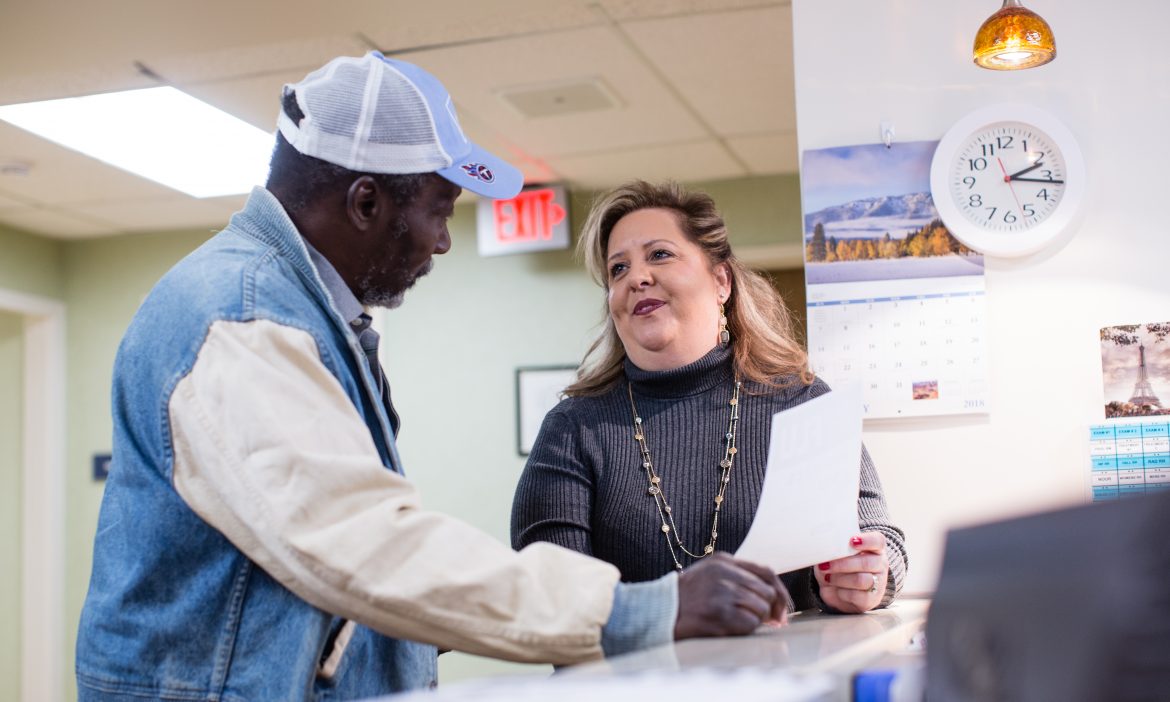When Charles Henderson, a member from Nashville, signed the lease on his apartment a few months ago, the first person he called was not his sister or another loved one – it was his BlueCross care coordinator, Kelly Hutchison.
“I never had a person in my corner like that before,” Charles says. “I wanted to share my good news with Kelly – she helped me up from rock bottom.”
Last spring, Charles was in bad shape – he had been homeless for more than a year, and faced a variety of health challenges including hepatitis C and prostate cancer.
“I didn’t really care about my well-being,” he says. “So when it hit me, it all hit at once.”
Charles’ primary care physician knew that other issues had to be resolved before his patient could focus on his health, so he asked the practice manager to connect Charles to a care coordinator for additional support. The practice manager assigned his case to Kelly.
Overcoming obstacles, one conversation at a time
In her role with BlueCross, Kelly spends most of her time directly communicating with patients, medical providers, transportation companies and others. She checks on members who have been discharged from the hospital to make sure they have what they need, and follows up with those who have missed medical appointments to see if there are barriers to care that need to be addressed.

Instead of working from a BlueCross office, Kelly is based at Saint Thomas Medical Partners in Nashville. That means she can meet with our members in person. In Charles’ case, she spoke with him for the first time face-to-face.
“I brought him from the exam room to my office, and we talked about what his needs were, what questions he had and what challenges he was facing, “ she says. “I explained to him that I couldn’t make miracles happen, but that I would be there along the way. ”
Kelly quickly arranged for transportation for Charles to all of his office visits. The process wasn’t perfect – occasionally there would be an issue with transport falling through, or a physician having to cancel a visit at the last minute due to an emergency.
“He was frustrated, and I was frustrated, but we bonded over the obstacles – I told him, ‘Don’t worry, don’t worry’ … and we would make an appointment and do it all over again.”
They stayed in contact a few times a week, taking turns reaching out to one another as their trust grew.
“If I hadn’t heard from him in a few days, I’d reach out,” Kelly says. “Just a quick touch-base, or sometimes he’d call me and ask, ‘Is there anything I should know about – anything I need to do?’”
The biggest concern was stabilizing Charles’ health situation.
“Sometimes he would have to see three or four physicians a week,” Kelly says. “But we made a plan, and we saw it through.”
Building confidence through coordinated support
As a nurse with more than 20 years of clinical experience, Kelly knows how important it is to gain her patients’ confidence. That was especially true of Charles.

In the weeks that followed after their initial meeting, Kelly built a relationship with Charles that enabled her to understand and respond to his needs. He had been staying in a shelter at night, largely relying on the occasional bus pass and his own two legs to get where he needed to go during the day.
Together, they set up a schedule based on where Charles needed to go during the week. Kelly helped him get a monthly bus pass as well as rides on various agency shuttles to his farther-flung destinations.
“With Charles, overcoming that particular obstacle of transportation made such a difference for him,” she says.
Charles had support from a church he attended, as well as family support – but he was reluctant to share too much with them.
“I made my own life decisions, and I didn’t want to burden anyone else with any negativity that resulted,” he says.

Kelly connected with social workers at the Nashville Rescue Mission to begin the process of getting Charles into permanent housing. Together, they partnered with his church and other community resources to ensure he had other needs covered.
When Kelly discovered he was traveling from Nashville all the way to Murfreesboro for medical treatments, she worked with the specialist’s office staff to move his appointments to a more convenient location.
Most people wouldn’t think a health insurance company would provide support like this for members. But Kelly’s work is a perfect example of the BlueCross focus on meeting members where they are, and helping them address issues that serve as barriers to wellbeing.
“Charles’ main issue was trust,” Kelly says. “He’d been through so much while homeless – he didn’t feel like he could rely on anyone else. The more things came together for him, the more his confidence grew – in us and in himself.”
Taking an active role
Less than a year later, Charles’ story has reached a new chapter. He enjoys cooking his own meals, and he diligently follows the calendar of activities and appointments Kelly sends him each month. Most importantly, his health has improved significantly.
Charles’ last radiation treatment was in early February. To celebrate, Kelly brought him a gift basket with kitchen items including spices and wooden spoons with his name on them.
“Kelly’s been there for me from my lowest point and through every bump in the road,” Charles says. “She encourages me and keeps me focused. I am so grateful for her.”
While the pair still checks in with one another weekly, Charles has taken the lead on addressing any concerns that arise and reaching out when he needs assistance.
“Seeing Charles take an active role in managing his life and his health has inspired me,” Kelly says. “Seeing his progress has been rewarding for both of us.”
“I hope Charles inspires others to trust the people that are there to help them – and can get them the help they need,” she continues. ”If they can get their health back, they can get back on their feet and have a new beginning.”
Developing a commitment to care
Kelly’s determination to get Charles the medical care he needed follows a lifetime of looking out for others. The Nashville native developed an interest in health care at an early age – an interest that surprised her family, who assumed she would follow them into the field of law enforcement.

“My dad was a criminal investigator for the state, and my mom worked for the Metro Police Department in the office of the Chief of Police – they thought that’s where I would land, too,” she says. “But I remember from the time I was really little, doctoring the dog by listening to his belly and checking his paws, I was determined to be a nurse.”
Kelly’s career path helped her acquire a wide range of clinical knowledge. After graduating from Nashville’s Aquinas College with her nursing degree, she began her career in obstetrics, then spent a brief period working in surgical intensive care and hospice nursing. She also taught in a pre-nursing program for high school students for a decade before coming to BlueCross in March 2017 as a patient-centered medical home care coordinator.
She was especially excited about the opportunity, which gave her the chance to be a part of positive change in the health care industry.
“Patients are seeing different doctors, being given different medications, different lab tests, having different procedures, and no one really knows what the other is doing,” she says.
“In the patient-centered medical home, we can request those records, make sure that the primary care physician is aware of what the specialist physicians are doing and what the hospital is doing, so that patients are receiving better coordinated care.”
Organizing care for better health
The BlueCross PCMH program, established in 2009, helps patients like Charles Henderson who are dealing with multiple chronic health conditions. The approach continues to prove its value – both in terms of health outcomes and cost savings.
- Inpatient hospital admission rates dropped by 4.7 percent for patients receiving care in a PCMH, and rates of ER visits have also dropped.
- The PCMH program achieved net savings of $1.6 million.
BlueCross currently has 55 nurses in care coordination roles – they are embedded with 29 PCMH practice partners at more than 340 locations across the state. More than 323,000 BlueCross members receive care from a PCMH practice , and that number will grow as the program expands.
“In the end, it all comes back to the member,” Kelly says. “The patient-centered approach is really beneficial for the people we serve, and that’s what matters most.”


 Alison has been a member of the BlueCross BlueShield of Tennessee corporate communications team since 2015. A Chattanooga native, she has a decade of health care communications experience including writing, editing, public relations and social media.
Alison has been a member of the BlueCross BlueShield of Tennessee corporate communications team since 2015. A Chattanooga native, she has a decade of health care communications experience including writing, editing, public relations and social media.